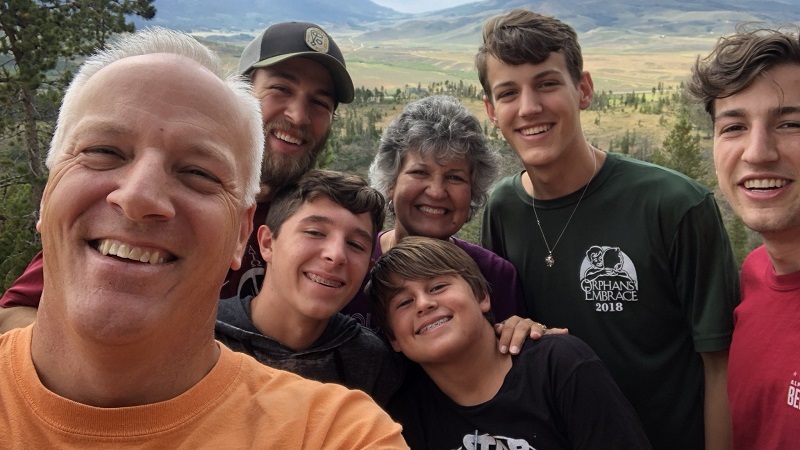Legislation proposing that home-schooled children in Texas receive the same opportunities for extracurricular activities as public school students is currently on the State House floor today, indicating progress toward passage.
House Bill 547, filed in November by Rep. James Frank (R-Wichita Falls) is also called the University Interscholastic League (UIL) Equal Access Bill and the "Tim Tebow Bill," in honor of the Heisman Trophy winner who played for public schools as a home-schooled student in Florida.
The bill would provide Texas home school families the ability to participate in the UIL's extracurricular programs through local public schools.

Sen. Angela Paxton (R-McKinney)
| angelapaxton.com/
HB 547 would end "discrimination against home-school students by giving them access to their tax-funded extracurricular activities in their local school district," Frank told the Nortex Times in February. "It also gives additional options to students to more fully form their education, regardless of where they live or how much money their parents have."
Created by the University of Texas at Austin, the UIL creates guidelines for and administers academic, musical and athletic contests for the state's public primary and secondary schools. It is the largest organization of its type in the world.
Home-school families pay taxes that support UIL programs but are prohibited from participating in many of the opportunities that UIL provides, including sports, chess, music, debate, wrestling and robotics.
"While some home-school parents have chosen to organize and enroll their children in private athletic leagues or other creative outlets, the prohibition against home-school student participation in UIL activities effectively eliminates extracurricular opportunities for home-school families of limited economic means or in rural areas that cannot support these private activities," Frank said.
HB 547's progress initially stalled after filed following its first reading on March 1 and being assigned to the House Public Education committee. The bill reported out of committee on April 23 and passed second reading on May 5. The bill briefly faced a technical point of order by Rep. Ken King (R-Canadian) against further consideration, but that order was subsequently withdrawn.
The bill was sent to calendars on Friday, May 7, leading to speculation that it may soon reach the House floor for debate.
In the state Legislature's other chamber, Senate Bill 491, sponsored by Sen. Angela Paxton (R-McKinney), is identical to HB 547. The Senate bill has received consideration in public hearing, but otherwise has not had the progress of its House counterpart. The Senate bill remains pending in that chamber's Education Committee.
HB 547 opponents, including the Texas High School Coaches Association, maintain that UIL participation should be limited only to public school students. THSCA Executive Director Joe Martin told 7 KLTV last week that he was concerned the legislation would not be uniformly applied.
"If there is adjoining school districts and one uses home school athletes and one doesn't, we will see some real rifts and some real rivalries created because there are opportunities in those schools that are allowing schools to participate," Martin said. "They don’t have to follow the same standards as those that are going to school every day in public schools."
HB 547 supporters say home-schooled children should have equal opportunity access to UIL events and that Texas should join 35 other states that allow home-schooled student participation in public school extracurricular activities, according to the House Research Organization's bill analysis. That participation is especially important for rural home-schooled students who reside in areas where opportunities for sports and extracurricular participation outside of the local public school are extremely limited.
Rural children are more likely to be home-schooled than those in more urban settings, according to statistics provided by the National Center for Education Statistics. Almost 4.4% of students in rural areas are home-schooled, compared to about 3% in cities and slightly less in suburban areas (2.9%), according to those statistics.
Equal access to public school extracurricular activities helps almost half of homeschool students from low-income households, according to a Texas Homeschool fact sheet.
"Home-school families of limited economic means or in rural areas that cannot support private home-school activities," Frank said in his Nortex Times interview.
Extracurricular activities are the most important item prioritized by respondents in an in-depth 2019 survey of Texas home-schooled families.
The percentage of Texas school-aged children being home-schooled almost tripled in 2020, from 4.5% last spring to 12.3% by last fall, by which time more than 1 in 10 households with school-aged children were being home schooled, according to a U.S. Census Bureau report. The Census Bureau data differentiated home schooling from pandemic-driven virtual learning through a public or private school.
The Census Bureau also noted that that home schooling in Dallas-Fort Worth metro areas rose from 5.8% to 8.2% during the same period and from 4% to 10.8% in the Houston metro area.
Public school withdrawal requests spiked last year, according to a report issued in September by the Texas Homeschool Coalition. The Lubbock-based coalition reported last summer that requests to withdraw students from public schools and into home school settings rose1,700% in July and 400% in August, compared to the same months in 2019.
Additionally, a May 2020 survey by Real Clear Opinions found that 40% of registered voters were more likely to enroll their children in a homeschool or a virtual school after the coronavirus. A Gallup poll found that the number of families reporting their children would be home-schooled doubled from 5% in 2019 to 10% in 2020.
"It should come as no surprise that more parents in all communities are choosing home schooling," Texas Public Policy Foundation Right on Work Analyst Erin Davis Valdez said in an email alert reported by the Dallas Express. "With many schools not offering fulltime in-person options, many parents saw the benefits in taking more of a direct hand in their children's education. Far from being a phenomenon confined to one socioeconomic group, the rates for home schooling doubled overall, and the increase was five-fold among black families."
In Texas, legislation like HB 547 still faces many challenges, including the short time remaining in the current legislative session.
"It is difficult to get any bill passed — there isn't a ton of time during session and it is a process designed to kill bills," Frank said.

